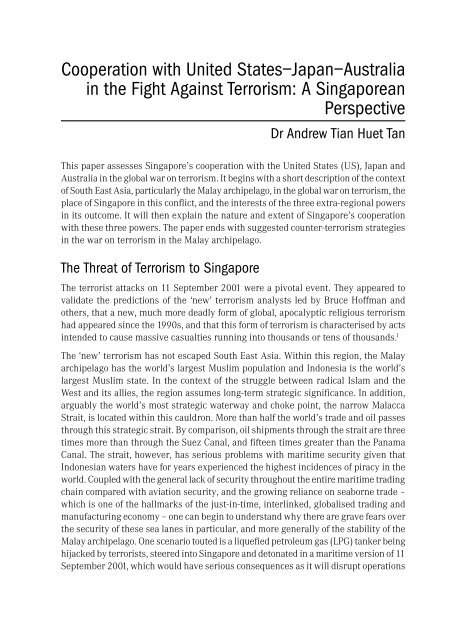Australian Maritime Issues 2007 - Royal Australian Navy
Australian Maritime Issues 2007 - Royal Australian Navy
Australian Maritime Issues 2007 - Royal Australian Navy
Create successful ePaper yourself
Turn your PDF publications into a flip-book with our unique Google optimized e-Paper software.
Cooperation with United States–Japan–Australia<br />
in the Fight Against Terrorism: A Singaporean<br />
Perspective<br />
Dr Andrew Tian Huet Tan<br />
This paper assesses Singapore’s cooperation with the United States (US), Japan and<br />
Australia in the global war on terrorism. It begins with a short description of the context<br />
of South East Asia, particularly the Malay archipelago, in the global war on terrorism, the<br />
place of Singapore in this conflict, and the interests of the three extra-regional powers<br />
in its outcome. It will then explain the nature and extent of Singapore’s cooperation<br />
with these three powers. The paper ends with suggested counter-terrorism strategies<br />
in the war on terrorism in the Malay archipelago.<br />
The Threat of Terrorism to Singapore<br />
The terrorist attacks on 11 September 2001 were a pivotal event. They appeared to<br />
validate the predictions of the ‘new’ terrorism analysts led by Bruce Hoffman and<br />
others, that a new, much more deadly form of global, apocalyptic religious terrorism<br />
had appeared since the 1990s, and that this form of terrorism is characterised by acts<br />
intended to cause massive casualties running into thousands or tens of thousands. 1<br />
The ‘new’ terrorism has not escaped South East Asia. Within this region, the Malay<br />
archipelago has the world’s largest Muslim population and Indonesia is the world’s<br />
largest Muslim state. In the context of the struggle between radical Islam and the<br />
West and its allies, the region assumes long-term strategic significance. In addition,<br />
arguably the world’s most strategic waterway and choke point, the narrow Malacca<br />
Strait, is located within this cauldron. More than half the world’s trade and oil passes<br />
through this strategic strait. By comparison, oil shipments through the strait are three<br />
times more than through the Suez Canal, and fifteen times greater than the Panama<br />
Canal. The strait, however, has serious problems with maritime security given that<br />
Indonesian waters have for years experienced the highest incidences of piracy in the<br />
world. Coupled with the general lack of security throughout the entire maritime trading<br />
chain compared with aviation security, and the growing reliance on seaborne trade –<br />
which is one of the hallmarks of the just-in-time, interlinked, globalised trading and<br />
manufacturing economy – one can begin to understand why there are grave fears over<br />
the security of these sea lanes in particular, and more generally of the stability of the<br />
Malay archipelago. One scenario touted is a liquefied petroleum gas (LPG) tanker being<br />
hijacked by terrorists, steered into Singapore and detonated in a maritime version of 11<br />
September 2001, which would have serious consequences as it will disrupt operations
















